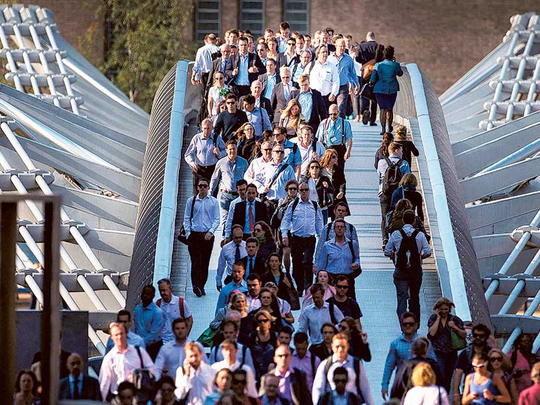
London: A 24-hour strike by staff and drivers brought the British capital’s underground rail network to a halt and left millions of Londoners struggling to get to work on Thursday.
London Underground’s bosses said no trains would run all day on the Tube, as the world’s oldest underground passenger railway is known, because of the stoppage. The strike follows a dispute over plans for new night services.
Commuters who usually use the underground network walked, cycled, battled to find taxis, or crammed onto crowded buses.
Many simply stayed at home.
Prime Minister David Cameron’s spokeswoman on Wednesday called the strike “unacceptable and unjustified”, while London Mayor Boris Johnson said it was “politically motivated”.
Twitter users posted pictures of overcrowded train platforms and long queues outside the stations while one commuter described scenes of “absolute carnage” on the buses.
Tony Clark, a radio producer who usually uses the rail network, turned to a boat service on the River Thames for his commute from Greenwich in east London.
“This (the boat) is the only way I can do it,” he told Reuters. “The buses aren’t feasible. I got up early to get in on time and now I think I’m going to be late.” The Tube usually handles up to 4 million passengers a day, with more than 535 trains in operation at peak times. Transport bosses said they had put on extra river services and 200 more buses to cope with extra demand.
But massive queues waiting for buses snaked down streets by the capital’s main rail stations. Taxi -hailing app Hailo said it had seen a 500 percent increase in pre-booked cabs, with demand more than double than they saw on New Year’s Eve.
Members of four rail unions representing staff from managers to drivers have joined the walkout, unhappy with the pay and terms offered by London Underground to implement 24-hour service at weekends on some lines, which is due to begin in September.
“They should stop playing games and start talking to us in good faith to get a sensible solution to this dispute,” said Manuel Cortes, leader of the TSSA union.
London Underground has said it has hired extra night drivers, offered a fair pay deal and said most staff would be unaffected by the changes. No one would have to work more hours, it said.
London Mayor Boris Johnson said the action was political, accusing the unions of having no interest in doing a deal. He told BBC radio that union leaders should “cut the cackle, stop the misery for Londoners and allow the Tube workforce to get on with their job”.
Compounding the problem for some commuters, staff on First Great Western, which provides services between London and western England, were also on strike.
A full shutdown came into force on Thursday, and TfL has warned that disruptions to the British capital’s public transport could continue into Friday.
Transport for London, the local government organisation responsible for most aspects of London’s transport system, said it would lay on 200 extra buses and more bicycle rental hubs, although it also posted walking maps of London on its website.
“Londoners who own a bike are encouraged to cycle to work,” the network administrator said in a statement.
To reach the Wimbledon tennis tournament, which ends this weekend, TfL said it was organising a taxi-sharing service from the nearest train station.
New all-night Underground services are due to start in September and drivers have been offered a pay increase, which was rejected by union leaders on Wednesday.
London Underground’s managing director Mike Brown said an all-night Tube service would support jobs and boost the city’s economy, adding that the offer had been “remarkably fair”.












